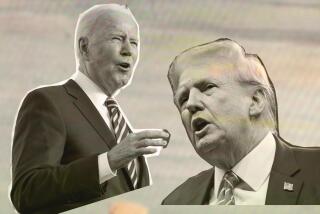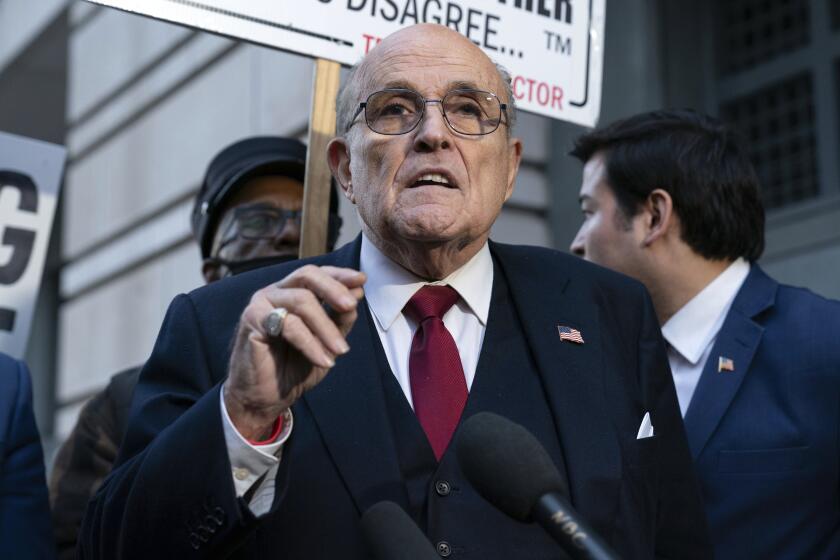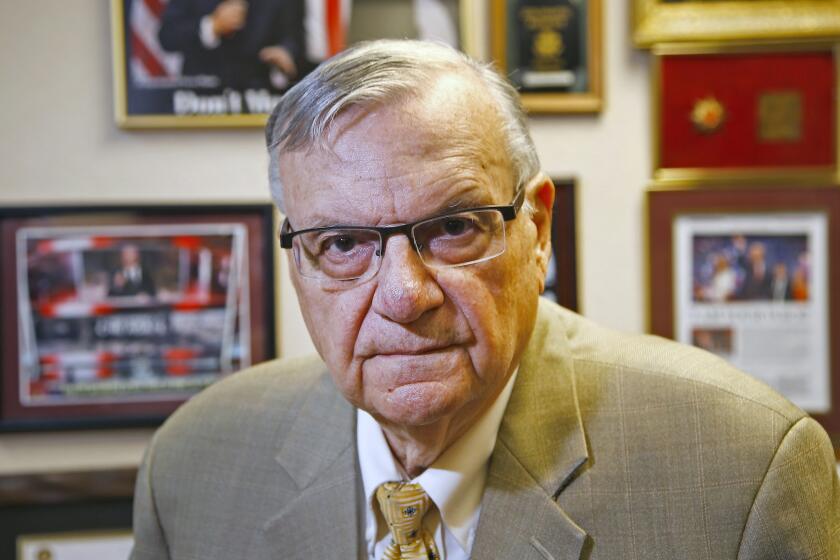Upstream Race to Senate : Activist McCarthy Seeks to Leave Political Sidelines
He is California’s premier political bench-warmer.
For nearly six years, Leo T. McCarthy has languished in the Capitol’s loneliest office--the post of lieutenant governor. While others have made the important decisions, he has watched from the sidelines.
A decade ago, McCarthy was considered one of the most powerful men in California. As Speaker of the Assembly during much of the 1970s, he was second only to the governor in the clout he wielded.
But now as lieutenant governor, the San Francisco Democrat has few duties and little official responsibility. He thinks of himself as an activist, but finds himself in a job where there is no action.
And so McCarthy has thrown himself into the campaign of his life--an uphill race he hopes will take him to the U.S. Senate. He has set his sights on unseating first-term Republican Sen. Pete Wilson on Nov. 8.
If he succeeds, it will be a crowning achievement for the perennial underdog, an immigrant of Irish descent who climbed to success from a poor working-class neighborhood in San Francisco’s Mission District.
At the age of 58, McCarthy is an articulate, serious politician who is more comfortable talking about issues than about himself.
With a kindly demeanor and friendly smile, he has the manner of a Catholic priest, which is what he once studied to be. But he also is driven to succeed, and those who have crossed swords with him have found him to be a tough and determined adversary.
Defender of Underdogs
Throughout his 25 years in public office, he has cast himself as a champion of the little guy, promoting such causes as nursing home reform and coastal protection.
At the same time, he has become a millionaire through a series of real estate transactions in California and Florida.
He remains deeply religious and, in his personal habits, is quite conservative. Politically, however, he is liberal in his views and he has adjusted somewhat awkwardly to the more conservative tone of the 1980s.
He is a notorious homebody who, when asked to name his biggest accomplishment after a lifetime of public service, responds without hesitation, “My family.”
As a candidate, however, he is lacking entertainment value in a political world increasingly blurred with show business. Reflecting in part the aura of his office, McCarthy has acquired the image that he is boring and lacking in charisma.
Blames His Office
“My problem is that the lieutenant governor’s office gives such a strong impression of blandness itself that all of a sudden the occupant becomes enshrouded with that bland quality,” McCarthy laments. “As far as I’m concerned, I’m dramatic and I’m charismatic.”
At 5 feet 10 inches, the brown-haired, blue-eyed McCarthy has gained a reputation as an aloof, intense politician. He is no back-slapper or glad-hander. He has a wry sense of humor, but often conceals it from friends and foes alike.
“Leo is not an entertainer, he’s a public servant,” said San Francisco Mayor Art Agnos, McCarthy’s former chief of staff and one of his closest friends. “I think he’s got a terrific sense of humor, but he’s usually so focused on getting a job done that he sometimes forgets to eat, he sometimes forgets to laugh, he sometimes forgets to do anything but how we solve this problem.”
Or, as state Controller Gray Davis, a longtime Democratic ally, put it: “Leo’s great strength is he’s a heat-seeking missile. He never loses track of his goal.”
Fought With Berman
McCarthy decided to run for lieutenant governor after he lost the Assembly speakership in a bruising, yearlong battle with his former friend and ally, then-Assemblyman Howard L. Berman. The 1980 struggle for power--which ended in defeat for both men and the election of Assemblyman Willie Brown (D-San Francisco) as Speaker--was prompted by McCarthy’s ambition to run for either governor or U.S. senator in 1982.
McCarthy emerged from the bitter fight as just another one of the 80 members of the Assembly. Not only did he lose his powerful leadership post, but the political infighting depleted his resources and hurt his chances of winning a major statewide office.
Forced to put his ultimate goal on hold, McCarthy reconciled himself to running for lieutenant governor.
“I wanted to prove that I had the respect of people on a statewide basis,” he explains now. “But I also felt when I ran that I could make more of this office than anybody else and I have done exactly that.”
A Difficult Job
Making something of the lieutenant governorship is not an easy task.
The lieutenant governor has few important decisions to make, and little in the way of rewards to offer supporters. The last time a lieutenant governor went on to higher statewide office was in 1953, when Goodwin Knight succeeded to the governorship upon the appointment of Earl Warren to the U.S. Supreme Court.
As lieutenant governor, McCarthy’s duties are largely ceremonial. His primary task is to be prepared to take over as chief executive should Gov. George Deukmejian vacate the office or become incapacitated.
McCarthy holds the title of president of the Senate, but he has presided over the house only on a few formal occasions and rarely appears on the Senate floor.
He also can be called on to break a tie vote in the Senate. But the opportunity to cast such a crucial vote has not arisen during his time in office.
Acting Governor
Whenever Deukmejian leaves California, McCarthy automatically becomes acting governor. In that role, McCarthy has signed into law about 80 minor bills--with the Republican governor’s blessing.
“I told him I wanted to sign some legislation, that I would enjoy that,” McCarthy said. “He was good enough to let it happen.”
McCarthy’s predecessor, Republican Mike Curb, stirred up considerable controversy by attempting to appoint judges and enact his own policies when the governor at the time, Democrat Edmund G. Brown Jr., traveled outside California.
In contrast, McCarthy has tried to build a cooperative relationship with his governor. Although they belong to opposing parties, McCarthy has rarely challenged Deukmejian on issues upon which they disagree. At the same time, the governor has not interfered with McCarthy’s efforts to promote specific legislation and has avoided publicly criticizing his Democratic understudy.
Boards, Commissions
The lieutenant governor’s obligations also include sitting on a variety of boards and commissions, including the UC Board of Regents, the California State University Board of Trustees and the state Lands Commission.
In his most significant action as chairman of the Lands Commission last year, McCarthy helped block a proposal by Atlantic Richfield Co. to build a new oil-drilling platform off the Santa Barbara coast. The three-member panel voted to place a moratorium on all new offshore drilling within three miles of the California coast until a comprehensive plan is prepared.
After his election as lieutenant governor in 1982, McCarthy began trying to build a statewide constituency in preparation for running for higher office. He spent a third of each month in Southern California, where he is less well known. And he began tackling issues that had little to do with his elective post.
Nursing Home Legislation
In 1984, he helped develop a package of nursing home legislation designed to improve care for thousands of elderly patients, lined up lawmakers to carry the bills, and fought the influential nursing home industry to push many of the measures through the Legislature.
“There isn’t a lot of inherent power in the office of lieutenant governor, so it tends not to be taken seriously,” he said. “But I’m willing to let what I’ve done in a relatively limited job as lieutenant governor stack up to what Pete Wilson has done with a powerful job in the same time frame.”
In 1985, in the anonymity of the lieutenant governor’s office, McCarthy quietly reversed his lifelong stand against the death penalty, a decision that has now become controversial as he runs for the Senate. Wilson has accused him of making an “election-year” shift in his position to appeal to more conservative voters. McCarthy insists that his decision to support capital punishment was not a political maneuver but a genuine change in his deeply held convictions.
Change in Attitude
“I had been taught as a youngster that it was wrong to take a life under any circumstances,” he explained. “I carried that with me for years. I suppose like many other people, I grew to see life differently. I saw there was just an unfair gap between the cruel effects of many murders and the 12-year sentences that were common in California.”
To win the lieutenant governor’s office in 1982, McCarthy defeated Republican Assembly Leader Carol Hallett in a bitter race highlighted by frequent personal attacks between the candidates. In 1986, McCarthy won reelection against former Lt. Gov. Curb in a hard-hitting campaign. McCarthy focused criticism on movies that Curb made in the 1960s featuring drugs, sex and violence.
Now in the Senate race, McCarthy is campaigning as a representative of the common man who is concerned about the plight of the elderly and the destruction of the environment. At the same time, he is attempting to paint Wilson as an elitist who favors the interests of the wealthy over the poor.
Private Characterization
McCarthy brings to public office an intense commitment. Some who have worked with him over the years privately describe him as a moralizer who at times can be a bit self-righteous.
“There’s no doubt that he’s very strait-laced,” said former state Sen. John Foran, a childhood friend and seminary schoolmate. “He has a very high sense of moral values that he’s taken with him all through his political career.”
McCarthy’s sober and diligent approach to politics is easily traced to his upbringing in a strict family where hard work was the order of the day.
Leo Tarcisius McCarthy was born in New Zealand in 1930, the fourth child in a family of Irish immigrants. He was named after Pope Leo XIII and a Catholic martyr--Tarcisius, who was stoned to death by a mob in the 3rd Century while carrying the Eucharist blessed by the Pope to Christian prisoners.
McCarthy’s father, Daniel, had left Ireland for New Zealand in search of greater opportunities. He got a job at a hotel, ended up as part owner and sent for his brothers and sisters in Ireland to join him.
Tried San Francisco
But Dan McCarthy, a trusting man who did business on a handshake, was swindled out of his share of the hotel by his partner. He packed the entire clan of more than two dozen McCarthys onto a boat bound for the United States.
Leo was 3 when the family arrived in San Francisco in 1934 at the height of the Great Depression. His family moved into the Mission District and crowded into a small apartment. His bed was a fold-out sofa in the living room. But he remembers that “coming to America was coming to paradise.”
Within two years, Dan McCarthy had opened a neighborhood bar called “McCarthy’s Big Glass,” where the elder McCarthy worked 16-hour days. His business grew, he opened new taverns and restaurants, and the McCarthy family moved into a larger house.
Young Leo was enrolled in Catholic school and recalls that his was a happy childhood in a close-knit community. He took tap dancing lessons, dressed up in a sailor suit and helped entertain the troops during World War II.
Priesthood Studies
When he reached high school, he enrolled in St. Joseph’s seminary to study for the priesthood. But he was not one for rules and regulations. He lasted three years, leaving after he was caught smoking cigarettes and sneaking some wine from the altar. “Let’s just say the management and I reached the conclusion at the same time that I ought to pursue another career,” he said.
He completed his schooling at a nearby Catholic high school, and now looks upon his education as the foundation for his career in public life.
“Most of what I got out of it was a moral framework for my conduct, a constant sense that ethics are important,” he said. “You need guideposts for your life. There are standards that must be met.”
After high school, however, McCarthy found himself at loose ends. He moved to Los Angeles and enrolled in interior decorating school. “I just wanted, like many kids that age, to get away from home, to try to swim by myself,” he said.
His wife, Jackie, added, “He’s great when you take him shopping, because he knows fabrics.”
Military Service
In 1951, at the height of the Korean War, he joined an Air Force Reserve unit in Long Beach. His unit was soon activated and he was shipped off to bases in Louisiana, Wyoming and Indiana.
The Air Force was a turning point for McCarthy. He went back to San Francisco with a new sense of purpose, enrolled at the University of San Francisco and began working in local political campaigns.
In 1956, he married Jackie Burke, who continues to this day to be his closest political adviser and his toughest critic.
McCarthy got a job as an aide to state Sen. Eugene McAteer and in 1959 witnessed the inner workings of the state Capitol for the first time. From Sacramento, he commuted home to attend San Francisco Law School at night and tend bar at one of his father’s taverns.
In 1963, McCarthy surprised even himself when, at the age of 33, he won a tough race for the San Francisco Board of Supervisors. For years, however, he remained an outsider in San Francisco politics, where he was viewed as a conservative.
Took a Beating
He ran for the state Senate in 1966 and was defeated. Two years later, he ran for the Assembly and won.
In 1974, while still in his third term in the Assembly, he staged a major coup by rallying Democrats to elect him Speaker, defeating the anointed candidate, San Francisco Assemblyman Willie Brown.
As Speaker for more than six years, McCarthy pushed a liberal social agenda: protecting the California coastline from massive development, supporting increased aid to the elderly and helping the children of migrant farm workers get better schooling. In the post-Watergate era of political reform, he also opened the legislative committee process to greater public scrutiny.
“I don’t mind being described as ambitious. But for whom?” he said. “I’m ambitious for the public. I have a very strong emotional drive when I see injustice. When I see abuses in nursing homes, I don’t remain passive. When I see kids working 12 hours in the field and falling asleep in class I don’t remain passive.”
Long-Distance Commuter
While he was Speaker, McCarthy amazed his colleagues by commuting every day between his San Francisco home and the state Capitol--a distance of 90 miles. McCarthy hated to be away from his wife and their four children overnight.
He also began taking a more active interest in his family’s own financial well-being.
In 1957, he and his wife purchased two flats in the Marina district for about $40,000. In the late 1970s, they began trading their property and investing in other real estate--buying and selling part-interests in land in Sacramento, apartments in Washington and mobile home parks in Florida.
By 1988, their investments included at least $337,000 in a mobile home park in Jacksonville, Fla.; equity of $400,000 in two condominiums overlooking the golf course at the La Costa Resort in northern San Diego County; more than $200,000 they plan to invest in houses in Alameda County; at least $55,000 in various stocks, and a home in San Francisco they bought in 1968 for $46,500 that is now worth at least $300,000.
The McCarthys’ tax returns for 1987 show they received $456,331 in income, including $378,413 from the sale of property and $70,143 from his salary as lieutenant governor. They paid $119,928 in taxes last year. He refuses to release tax returns from previous years, saying it is personal information.
Finances Kept Separate
McCarthy acknowledges that he is a millionaire but bridles at any suggestion that he somehow used his public position for his personal benefit.
“If there’s one thing I have after my years in Sacramento, it’s my reputation for being extremely honest,” he said. “I ran the house as Speaker with very strict standards and I run my own conduct with very strict standards.”
McCarthy does not recall any single incident in his early years that steered him into politics.
“I was taught by my parents not only to do the right thing for my own family, but to be of service to my community,” he said. “California and this country have given my family an extraordinary opportunity to do well. My mother and father always made a point of saying, ‘Don’t forget to pay back.’ ”
More to Read
Get the L.A. Times Politics newsletter
Deeply reported insights into legislation, politics and policy from Sacramento, Washington and beyond. In your inbox three times per week.
You may occasionally receive promotional content from the Los Angeles Times.






